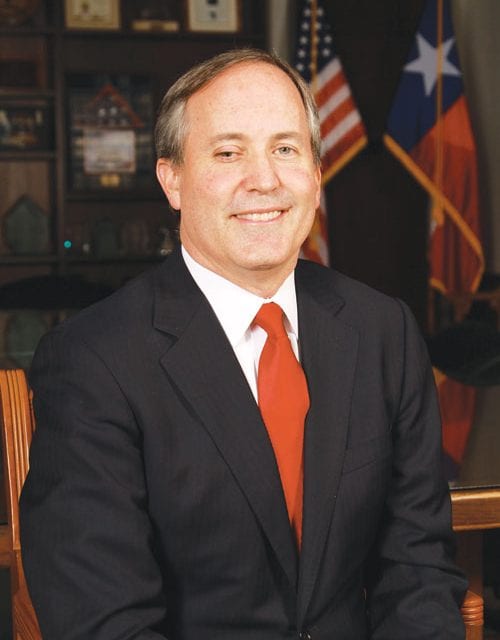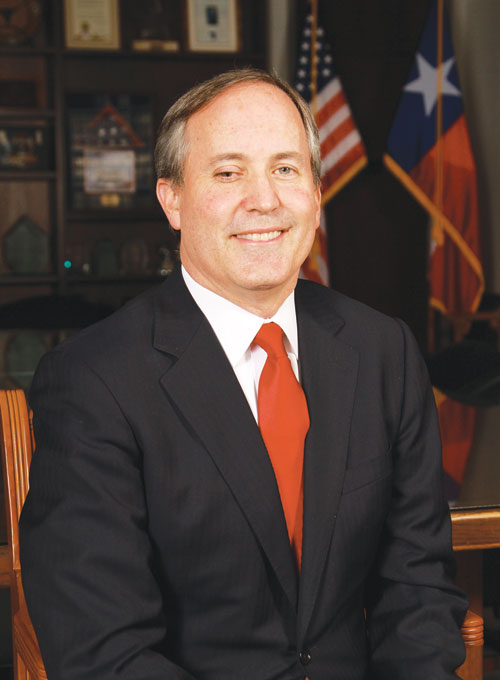Compiled by the Dallas Voice news staff
A flurry of legal rulings coming out of state courts in Travis County this week left an Austin lesbian couple with a legal marriage license and a very public wedding ceremony on Thursday morning, Feb. 19.
But by that afternoon, Texas Attorney General Ken Paxton had stepped in and gotten the Texas Supreme Court to issue a stay on the nuptials between Sarah Goodfriend and Suzanne Bryant, also ensuring that no other same-sex couples are able to use similar tactics to obtain marriage licenses in Travis County.
In a statement issued early Thursday evening, Paxton said: “The court’s action upholds our state constitution and stays these rulings by activist judges in Travis County. The same-sex marriage license issued by the Travis County Clerk is void, just as any license issued in violation of state law would be.”
Paxton has pledged to “continue to defend the will of the people of Texas, who have defined marriage as between one man and one woman, against any judicial activism or overreach.”
But a Dallas lawyer and former judge offered a different interpretation of the state Supreme Court’s stay.
Barbara Rosenberg, who works in the Dallas City Attorney’s Office, told Dallas Voice that her understanding is that the ruling can only stop future licenses from being issued.
“The [status of the ] marriage will be determined by the outcome of the cases,” she said. “
Looming over the proceedings is the possibility of a ruling from the federal Fifth Circuit Court of Appeals in another Texas marriage equality lawsuit that could nullify Paxton’s maneuvering. And above even that looms a U.S. Supreme Court ruling that is expected as early as June.
This most recent round of the marriage equality battle started on Tuesday, Feb. 17, when Travis County Probate Judge Guy Herman issued a ruling striking down Texas’ ban on legal recognition of same-sex marriage. Herman’s ruling came as part of an estate fight between Austin resident Sonemaly Phrasavath and the siblings of her late partner, Stella Powell.
Phrasavath filed suit seeking to have her eight-year relationship with Powell recognized as a common-law marriage, after Powell died without a will last June following an eight-month battle with colon cancer.
Paxton intervened in that case Tuesday after Herman issued his ruling, asking the Texas Supreme Court to first stay and then overturn the ruling.
On Thursday morning, Sept. 19, state District Court Judge David Wahlberg, also in Travis County, ruled in a suit filed by Goodfriend and Bryant who asked the court to order Travis County Clerk Dana DeBeauvoir to issue a marriage license to them, on the condition that they were in a medically fragile situation because of Goodfriend’s battle with ovarian cancer.
Wahlberg issued a temporary restraining order instructing DeBeauvoir to issue the license, declaring the marriage ban unconstitutional and waiving the usually-required 72-hour waiting period. That allowed Goodfriend and Bryant to be married immediately, and they did just that in a ceremony performed in front of the clerk’s office, officiated by Rabbi Kerry Baker.
Paxton again intervened, asking the state Supreme Court to stay Wahlberg’s order and “any state court proceedings that seek to undermine the constitutionality of Texas’ marriage law.” Paxton asked the court to void Goodfriend’s and Bryant’s marriage license and is filing suit to enjoin the Travis County Clerk from issuing any marriage licenses to any other same-sex couples.
A statement issued Thursday by Paxton’s office also noted that the Texas AG has filed a response with the federal Fifth Circuit Court of Appeals, opposing a motion by plaintiffs in DeLeon v. Texas, asking that the stay of trial court judge’s ruling overturning the Texas marriage ban be lifted immediately, allowing same-sex marriages to begin statewide.
U.S. District Judge Orlando Garcia in San Antonio ruled in February 2014 that the Texas constitutional amendment banning legal recognition of same-sex marriages violates the U.S. Constitution, but issued a stay of his ruling pending appeals.
The Fifth Circuit Court heard oral arguments in that case, along with one case from Louisiana and one from Mississippi, on Jan. 9, and could issue its ruling any day. The U.S. Supreme Court has taken appeals on four marriage equality cases out of the Sixth Circuit Court of Appeals — the only federal appellate court to rule against marriage equality since the U.S. Supreme Court overturned portions of the Defense of Marriage Act in June 2013.
The U.S. Supreme Court is expected to hear oral arguments in those cases in April and to issue its ruling sometime in June. That ruling, most pundits agree, is likely to come down in favor of marriage equality, possibly even by a 7-2 margin.
This article appeared in the Dallas Voice print edition February 20, 2015.


